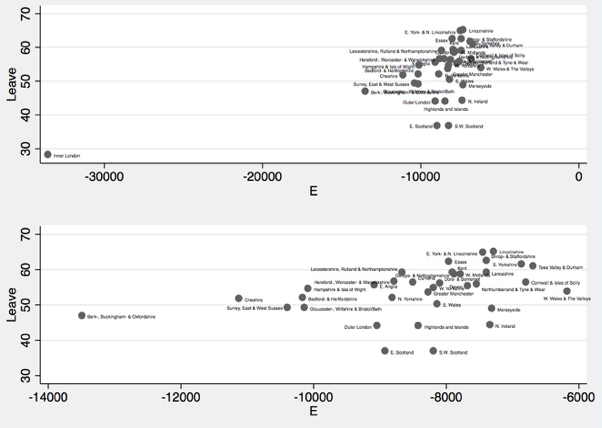Recent research finds that the way people perceived the economic outcomes of immigration influenced whether or not they voted “Leave” in the Brexit referendum:
The pattern of voting in the referendum reflects differences in the share of the over-65 group and the less educated across regions (with these two groups more likely to vote for Brexit). A high rate of immigration and low levels of GDP per capita also correlated with greater propensities to vote to leave. These variables explain not only the voting patterns but also the attitude towards immigrants as neighbours, the perceived dangers posed by immigrants to society, and feelings of apprehension towards the EU. Figure 2 shows the relationship between the latent economic variable E[ref]This was done by “by assigning coefficients to the rate of unemployment for each region, GDP per capita, the share of the working-age population with low education, the rate of immigration, and the share of the population over 65 in each region.”[/ref] and the leave vote by region.
 The researchers also found that “an increase in GDP per capita of €5,000…will lower the share of the leave vote by 0.55%. An increase of 5% in the share of the population over the age of 65…will increase the leave vote by 3.3%. A 5% increase in the share of the population with low education…will increase the leave vote by 4.8%.”
The researchers also found that “an increase in GDP per capita of €5,000…will lower the share of the leave vote by 0.55%. An increase of 5% in the share of the population over the age of 65…will increase the leave vote by 3.3%. A 5% increase in the share of the population with low education…will increase the leave vote by 4.8%.”
The authors summarize,
We have found that old people and those with low education and low income tend to dislike immigration and fear the influence of the EU, and therefore voted for Brexit. A likely reason is that they feel vulnerable to immigration from other European countries. However, the empirical evidence on the adverse effect of immigration on the labour market is weak, although there is some evidence that the lowest-skilled workers in the UK may be adversely affected by immigration…Given the limited effect on wages, an exaggerated fear of immigration in public debate may have influenced voters to want to leave the EU. Thus, voters perceive the numbers and effects of immigrants as being much greater than they actually are.